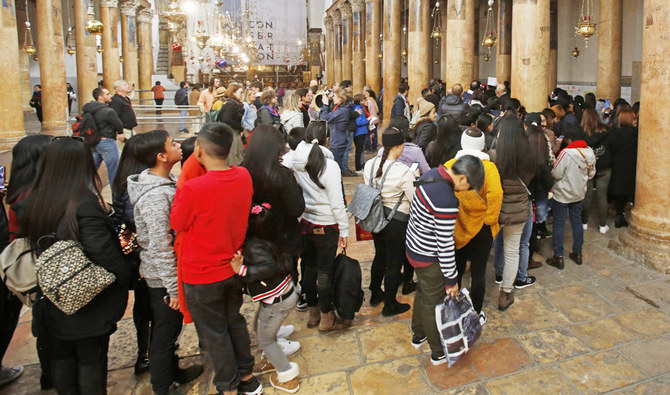AMMAN: Mahmoud Abbas signed a presidential decree Sunday guaranteeing a minimum of seven parliamentary seats to Palestinians of the Christian faith. Palestinians in the occupied territories are expected to choose 132 legislators based on proportional representation.
Former Bethlehem Mayor Vera Baboun told Arab News that the new legislative council needs to mirror Palestinian society’s diversity so as to include a plurality of Palestinians, saying: “The upcoming elected council needs to reflect the widest national experience and representation of all of our society including women and Palestinian Christians.”
Ramzi Khoury, head of the Presidential Higher Committee for Churches Affairs, welcomed the decision, saying this is the first time the quota is open-ended.
“The fact that the decree calls for a minimum of seven members are welcomed because it gives opportunities for Palestinians of all walks of life to compete with the opportunity of more individuals being elected than the minimum quota,” he told Arab News.
Jerusalem’s Orthodox Archbishop of Sebastia Atallah Hanna told Arab News that Palestinians welcome this decision.
“We wish generally for the upcoming Palestinian Legislative Council to bring in new blood and we hope that they are chosen based on qualifications and abilities.”
Nashat Filmon, director of the Palestinian Bible Society, said it is good to have a guaranteed representation that reflects the Palestinian Christian presence in the cradle of Christianity.
“I would like the representatives to the Palestinian Legislative Council to focus on the living stones, the Christians of Palestine, and not just the physical stones that represent the history of Christianity in Palestine,” he told Arab News.
Ibrahim Daebes, a former Christian school principal and a leading columnist for Al Quds daily, told Arab News that it is imperative that the new representatives act to curtail hate speech.
“Palestinian Christians are facing personal and religious persecution from all corners and it is important for the newly-elected council to draft legislation that can put a stop to radical elements within our society who spew hate speech and religious bigotry at fellow Palestinians,” he said.
Bernard Sabella, former member of the Palestinian Legislative Council, welcomed the decision of the President. “This is an excellent decision because our experience is that the Palestinian electorate votes on the basis of geography, not nationality,” he said.
Sabella added that previous experience which was not successful “requires us to have a new vision and a holistic plan that addresses our needs. We need our representatives to represent their nation and not a religion.”
He added: “We are at a political crossroads and we can’t live with the mindset of the 1950s, 1960s and 1970s. While I respect ideologies, we need to revive international support for the Palestinian cause and to stop the rhetoric that fails to face the local and international realities. What we need instead is to look to improve our steadfastness on the ground and to work for a state that will help us in this effort to stay put on our land.”




























